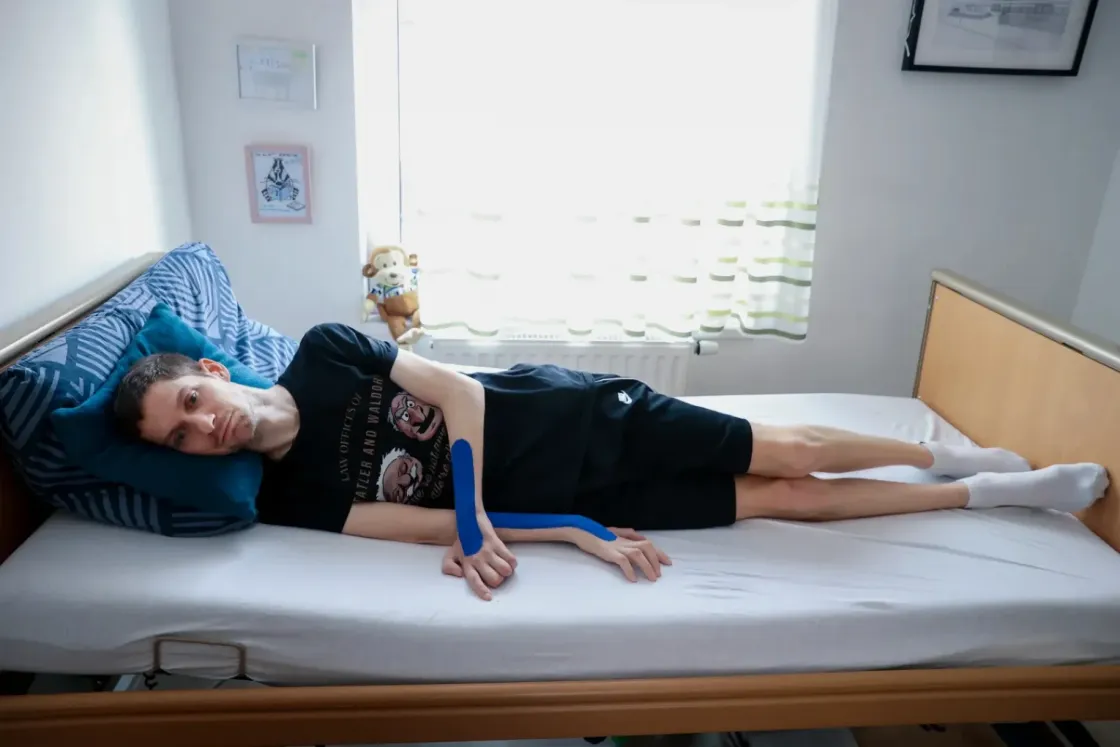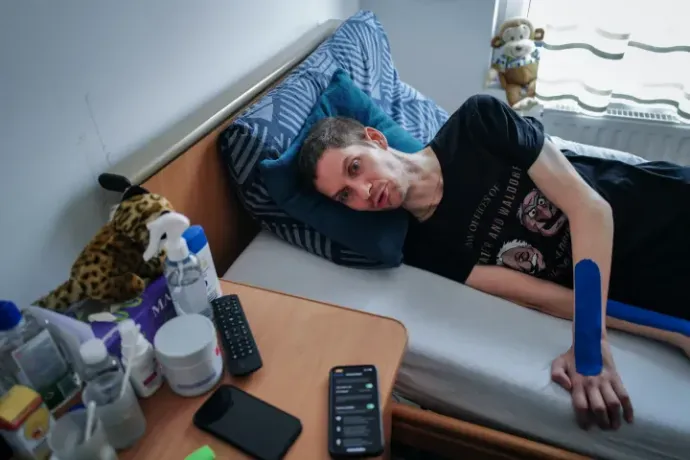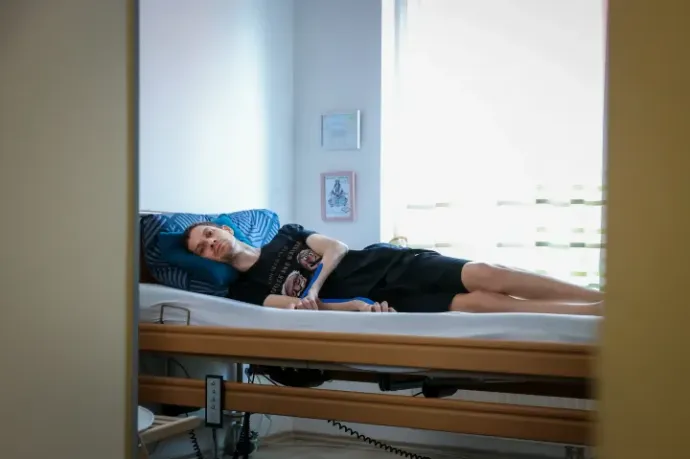
Although Hungarian law is not likely to change any time soon, Dániel Karsai considers the results of his fight for the legalization of euthanasia a great success. He believes that his efforts have helped make the subject a public matter in Hungary, which has led to a wide section of society being open to thinking about it. We interviewed the terminally ill constitutional lawyer whose words are now barely intelligible in his home.
While we were preparing for the interview, it became clear that Dániel Karsai wasn’t going to be able to communicate much longer. This is why his assistant, who manages his public engagements, asked us to prepare only with "yes or no" questions. In the days leading up to the interview I wondered whether there was even any point in interviewing him this way. In the end we decided that if we asked the right questions, he would hopefully be able to convey some of his thoughts. Moreover, it could be one of the last times he can address the public before the disease traps the thoughts of his healthy mind inside his atrophying body and he definitively loses the ability to speak.
Dániel Karsai was diagnosed with ALS almost two years ago. This disease causes the nerve cells that control muscle movement to atrophy, which over time leads to complete paralysis. At the end of the disease, respiratory function is also lost leading to death by asphyxiation. Throughout it all, the mental faculties remain unaffected.
Since euthanasia is not allowed in Hungary, Karsai, a constitutional lawyer filed a case at the European Court of Human Rights in Strasbourg hoping to be able to end his life with dignity at a time of his own choosing. The Hungarian government then lodged a counter-petition asking the court to declare Karsai's request for euthanasia inadmissible, to which Karsai has submitted a response. At the end of the 17-page legal document, Karsai states that the current Hungarian law deprives him of all control over the end of his life, forcing him to endure suffering until his inevitable death.
The constitutional lawyer who suffers from ALS went public last September. His hope is that by making the effects of his disease – which eventually leads to complete paralysis followed by a slow death – visible to the public, he can contribute to active euthanasia being legalised in Hungary. Active euthanasia would allow those suffering from terminal illnesses to opt for hastening their death.
The day before the interview, we received news that Karsai was in better shape than expected and would be able to answer our questions at greater length.
When we arrived at his apartment, he was reading. His caregiver took the book and removed the bars from the edge of his bed. "You've got half an hour," he said, because although Karsai can talk, it requires a major effort. His words were hard to understand, so I had to watch his mouth intently; he spoke eloquently, in long sentences. I often repeated what he had said back to him to make sure I understood correctly; several times I had to ask him to repeat certain parts of what he had said.
In recent weeks, 24.hu published a video and 444 did a photo report showing what his days are like at this point. The once-strong, 90-kilo man now lies emaciated, completely unable to care for himself, no longer able to do anything independently except think. He has someone in his home 24 hours a day to care for him. His friends and family use an Excel spreadsheet to keep track of who can spend two or three hours with him, while a professional nurse, Ákos, spends the most time with him.

I was mainly interested in how he feels, what keeps him going, and how he sees the result of his work to legalize euthanasia so far.
The decision is in the hands of the Fidesz majority in parliament, which has so far shown no interest whatsoever in Karsai's case. The most serious, truly inhumane manifestation of this was when he went to parliament last December and most Fidesz politicians walked past him without so much as looking at him.
In spite of this, Karsai feels that he has achieved much more than he previously thought possible, and says that even if he himself will not live to see the legislation changed, the subject will never go back to where it was six months ago.
“I wasn't concerned with whether euthanasia would be legalized in my lifetime. Even the fact that it became such a public matter is a huge success.”
He also considers it a success that a civilized debate has now developed on the issue. There are tens of thousands of people in Hungary who are in a situation similar to his because of some illness, and legalizing euthanasia could reduce their suffering. Moreover, by his own admission, Karsai is in a privileged position. Most people in this situation are not fortunate enough to be cared for by their extended circle of friends and family, and many people have barely anyone to rely on.
The attitude of the governing parties, which are constantly monitoring public opinion, is particularly difficult to understand because several opinion polls have shown that the majority of Hungarians support the legalization of euthanasia.
When our conversation had gone on for more than half an hour, at one point his words were becoming harder to make out, but he said he wasn’t tired. In fact, he told me that it was opportunities like this interview that were keeping him going. It is this sense of mission that has made him realize that even in this state, his life has meaning.
“I'm not ashamed of any aspect of this disease, and I want to continue to show it all the way through so that no one else would have to.”
His brother had earlier told ATV that they were long past the point he had previously said he didn't want to get to. Dániel Karsai had at one point told his close family that he would no longer see any point in living once he had completely lost his ability to care for himself.
He is now past that point: reduced to almost complete immobility, with no privacy at all, he even needs help blowing his nose, which he says is a humiliating experience. Despite this, he has changed his previous position and continues to see his life as meaningful and useful because he is able to communicate with the outside world.
"I used to think that if I reached this point, I wouldn't want to live anymore. But now that I'm here, I think that losing the ability to actively communicate would be the thing that would make my life so constricted that it would no longer be worth living," he says.
He told us he wasn't sure if that state would actually come, or if he might die before it does. If it does happen, and he can find other ways of communicating, he will ask himself again whether there is any point in continuing to live like that. Even in his current state, he would not choose euthanasia if he could. It is not only the cause that is keeping him alive, there are also many good things in his personal life. He adds that there are still one or two outstanding human rights cases in the country, and he could see himself finding a new public mission.
“It's not the fear of death that's holding me back, but the fact that life is still good. I am currently still working on my case, we're talking about constitutional issues – not directly, but about the personal context.”
He usually reads the articles written about him, and specifically looks for counter-opinions, all of which help him to face things. He also often reads readers' comments, in which people are always encouraging him.

But a mirror is more useful than all of these, he said, pointing to the huge mirror on the cabinet behind me. "It doesn't encourage me, it's always honest." He said he needs that, because on the inside he always thinks his situation is better than it actually is. His nurse, Ákos, confirms that people suffering from such serious illnesses usually think their condition is better than it actually is.
Do you dream? – I asked. He said he does dream, but added that he usually doesn't remember his dreams later on. In the ones he does remember, he is always healthy, and is out and about, walking in the street.
What's it like to wake up from this? – I asked.
"Well... it is what it is," he said.
He doesn't cry, but does laugh, although he finds it hard to tell whether he's crying or laughing. This is because laughing causes terrible, painful spasms. He still finds much pleasure in football, however, and told me that on Monday, for example, Vasas beat Honvéd 3-0. When I told him that I didn't follow football at all, he explained: "For us Vasas fans, it's like Fradi playing Újpest.”
Do you ever envy healthy people? – I ask.
"Yes. For example, whenever Ákos eats beef or any meaty food, I could choke him."
– he said with obvious irony. He's been fed through a feeding tube since April: this is a tube built into his abdominal wall through which nutrients are introduced into his body.
As we left, he said "Viszontlátásra!" (=until I see you again! in Hungarian) and then added that he meant it.
As I walked out of the door with my photographer colleague, I wished him much strength.
After I returned to the office, several people asked whether it was hard. I replied with a “no”, and by the afternoon I came to the realization that it was actually rather uplifting to see a man in such a predicament being so determined and so strong.
Then two days later, while out for a morning run, I was thinking about what I was going to write about our time with Dániel Karsai, and then suddenly broke down in tears and couldn't stop for several minutes.